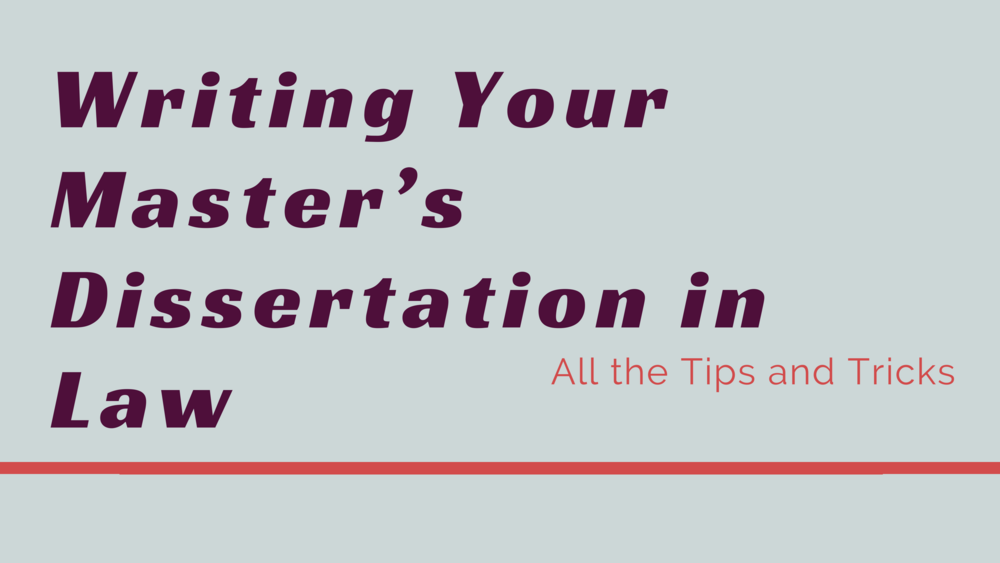Writing Your Master’s Dissertation in Law – All the Tips and Tricks

You are close. The coursework is completed and you are about to embark on that one final part of your journey – producing that master’s law dissertation and earning that degree.
You and your advisor have met and agreed upon your topic. And this should be a topic in which you have great interest. To write a dissertation in law on a topic that you find uninteresting is a law students’ definition of hell. So, whether it’s the issue of illegal waste dumping by corporations in under-developed countries or the issues of personal injury lawsuits when the defendant’s corporate headquarters is in a foreign country, get a research topic that will motivate you to research and write.
The Basics – Structure and Content
This is all new to you. While you may not understand how to write a good law dissertation, many others have successfully done so. In your research, you will review many outstanding dissertations, so take your cue from those. It will be a good idea to spend some time reviewing an example of law dissertation writing in your topic area to get a better idea of structure.
In general, however, there is a basic structure for the piece, and this structure should guide your planning and writing. Here are those structural elements:
- The Dissertation Proposal
Before you can begin your research and writing, you must craft that proposal for advisor approval. You may not know how to write a law dissertation proposal, but others have done this before you. Check with some of your peers or recent graduates and get some advice. In general, your proposal must include the following:
- A solid statement of your research topic. It should include a hypothesis that states what you believe your research will reveal.
- A brief summary of the early initial research you have done so far that has piqued your interest in the topic
- A justification of why you think your research topic is important. How will others benefit from your work?
- A timeline that will set benchmark dates for completion of each part of your work and the final piece.
- The Dissertation Abstract
This is a one-page summary of your work (200 – 250 words). It will include the purpose of your research, your hypothesis, and make reference to the conclusions you have reached. This will not be written until the piece is finished. Writing a law dissertation abstract can be a challenge – you are reducing a huge amount of work to a single page.
The Structure
While some institutions may have very specific guidelines, in general the structure of your law dissertation will be as follows:
- Length: Generally, law dissertations are about 15,000 – 20,000 words – approximately 80 pages, excluding your appendices (if any) and your reference and footnote pages.
- Title Page: This will be a separate page. The title itself should be a structured as a single stand-alone phrase or as a shorter phrase followed by a longer phrase that provides more detail. “Legal Redress of Illegal Waste Dumping – a Case Study of Trafigura and the Ivory Coast.
- Table of Contents: This will list each chapter and any main sub-headings, with appropriate page numbers. Important chart or graphs should also be listed with page numbers. Appendices should also be listed, if you have them.
- Chapters: You will structure your chapters as you believe to be best. Remember, you are telling a type of story, so keep that in mind.
- Introduction: this chapter will introduce the topic, its importance, and the hypothesis that you have developed. If it is a case study, introduce the “players.” Often, your literature review may be contained in the Introduction, depending upon the guidelines of your department.
- Background: This chapter is included if you need to provide a more detailed description of the legal issue. In the example above of Trafigura, you may want to provide a historical context, including applicable UK, Ivory Coast, and international law.
- Substantive Issues: Each chapter from this point forward should address one of the issues in your study. Make sure that you have a good introduction for each chapter, cover the issue, and the provide a transition to the issue of the next chapter. There should be a logical flow from chapter to chapter. Sub-headings within each chapter are a good idea if the issue is complex.
- Summary/Conclusion Chapter
This chapter should provide a summary of all of the issues you addressed in your research and chapters, and their implicimplications specific area of law. You are not expected to come up with some new contribution to your field – that is reserved for the Ph.D. thesis. What you are demonstrating is that you are a “master” in a specific area of law. Regarding conclusions, this is an area that many students gloss over. Conclusions might include, for example, the implications of issues for future legal situations involving the same body of law.
- Appendices, Footnotes, and Bibliography
Follow the department guidelines for formatting.
It’s a Lot of Work
Yes, you will struggle at times; and you will have challenges that are really frustrating. When you become too anxious or stalled, you may want to look to buy law dissertation assistance from a professional writing service – one that has law experts to act as consultants as you move through this process.
Additional Law Dissertation Writing Tips
Here are a few things that may help:
- To identify your topic area, start with a broad area and then narrow it down to something that really interests you.
- Don’t scrimp on the research. You want to become an expert. And as you do your research, keep the content organized into sub-topics so that you can synthesize everything before you begin to write.
- Craft an outline, so that you have a good idea of chapter divisions. Make the large divisions like the chapters in a novel.
- Do not ignore your institution’s formatting requirements. If you don’t follow them, you will be getting it back for corrections.
- Start early and give yourself plenty of stress-reducing breaks. The biggest obstacle to completion is psychological. You cannot just forge ahead and think you will get it hammered out. You will lose focus and motivation.
- Count on having a number of revisions – it’s just the “nature of the beast.” But don’t become such a perfectionist that you never “put a period on it” and get it submitted.
- Be bold. You can state an opinion; you can take a stand on something; you can be creative (in fact, you should); you can add human interest. Some pizzazz will keep your reader engaged.
- Be careful about plagiarism. This usually happens when sources are not cited correctly, so check and double-check your citations.
- Get another to review and edit your final draft. You are too emotionally involved in your piece and will miss some clear errors.
There you have it. You law dissertation is a huge project. Divide it up, take breaks, eat and sleep right, and do not give up your social life – you will become really resentful. Most of all, remember this – many of done this before you, and you will get through it too.









